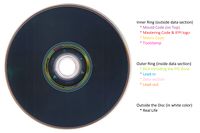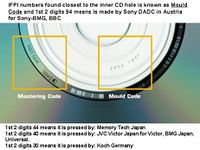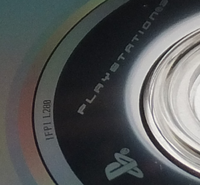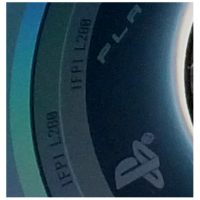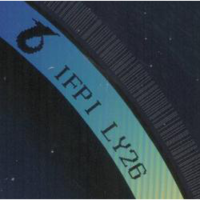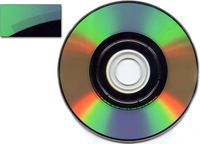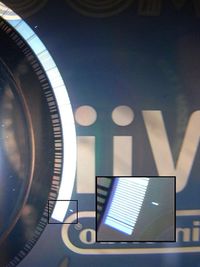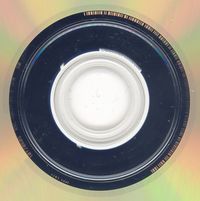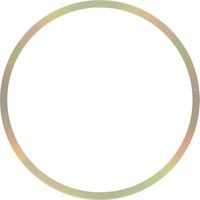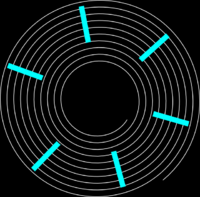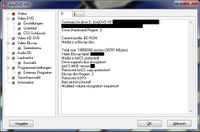Disc Identification/Serialization Data: Difference between revisions
mNo edit summary |
mNo edit summary |
||
| Line 21: | Line 21: | ||
=== Layout === | === Layout === | ||
unique ASCII of length 9 to identify, used for PS1/PSX, PS2/PStwo, PS3, PSP, PSP2/Vita. | unique ASCII of length 9 to identify, used for PS1/PSX, PS2/PStwo, PS3, PS4, PSP, PSP2/Vita. | ||
format: XXXXYYYYY (lettercode for XXXX / numbers for YYYYY) | format: XXXXYYYYY (lettercode for XXXX / numbers for YYYYY) | ||
Revision as of 13:44, 14 September 2014
The Identification & Serialisation Data from a PlayStation 4 Game Title contains several Information, which you can find not only on any Game Disc pressed for the PlayStation 4, but also similar for any PlayStation 3 and/or any other Console-based Game Disc, and other Media pressed on CD, DVD and Blu-ray.
Productcode
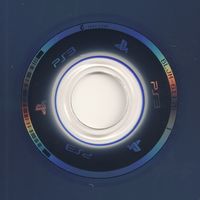
Main article: Productcode
Layout
unique ASCII of length 9 to identify, used for PS1/PSX, PS2/PStwo, PS3, PS4, PSP, PSP2/Vita.
format: XXXXYYYYY (lettercode for XXXX / numbers for YYYYY)
Source Identification Code
The Source Identification Code (SID-Code) can be found on almost all pressed optical discs worldwide since 1994, originally planned as a piracy safeguard, but it's also used for acceptance sampling. It contains two codes, a Mould Code and a Mastering Code. Each code consists the digits "IFPI" (named by the International Federation of the Phonographic Industry) followed by a four or (less often) five-digit code. These two codes are located in the inner ring from any optical disc (outside the data section) and can be used to trace the location from a manufacturing or mastering plant, where the disc got pressed.
Mastering Plant SID-Codes
Note: There were no distinctions between a single-layer and a dual-layer Game Disc pressed on DVD, UMD and BD.
| Region | Disc Type | Platform | SID-Mould Code | Inner Ring Side | SID-Mastering Code(s) | Inner Ring Side | Mastering Plant | Country | Facility | Remark |
|---|---|---|---|---|---|---|---|---|---|---|
| Japan | CD | PSX | IFPI 45** | Bottom | IFPI L272 IFPI L274 IFPI L275 IFPI L276 |
on Top | Sony DADC Japan Inc. | Shizuoka - Haibara District, Shizuoka Prefecture | [1] | |
| Japan | CD | PS2 | IFPI 45** | ? | IFPI L274 IFPI L275 |
? | Sony DADC Japan Inc. | Shizuoka - Haibara District, Shizuoka Prefecture | ||
| Japan | DVD | PS2 | IFPI 45** | ? | IFPI L271 IFPI L272 IFPI L275 |
? | Sony DADC Japan Inc. | Shizuoka - Haibara District, Shizuoka Prefecture | ||
| Japan | UMD | PSP | ? | ? | IFPI L271 | ? | ? | ? | ? | |
| Japan | BD | PS3 | IFPI 45** | on Top | IFPI L279 IFPI L280 |
Bottom | Sony DADC Japan Inc. | Shizuoka - Haibara District, Shizuoka Prefecture | ||
| Japan | BD | PS4 | ? | ? | ? | ? | ? | ? | ? | |
| North America | CD | PSX | IFPI 50** IFPI 51** IFPI 72** |
Bottom | IFPI L330 IFPI L336 IFPI L424 |
on Top | Sony DADC US Inc. | IFPI 50** = Pitman, New Jersey IFPI 51** = Terre Haute, Indiana IFPI 72** = ? |
[2] | |
| North America | CD | PS2 | IFPI 50** | ? | IFPI L327 IFPI L330 |
? | Sony DADC US Inc. | Pitman, New Jersey | ||
| North America | DVD | PS2 | IFPI QW** | ? | IFPI L327 IFPI L330 IFPI L331 IFPI L332 |
? | Sony DADC US Inc. | Terre Haute, Indiana | ||
| North America | UMD | PSP | ? | ? | IFPI L330 IFPI L331 IFPI L332 IFPI L333 |
? | ? | ? | ? | |
| North America | BD | PS3 | IFPI QW** | on Top | IFPI L321 IFPI L322 IFPI L323 IFPI L324 IFPI L325 |
Bottom | Sony DADC US Inc. | Terre Haute, Indiana | ||
| North America | BD | PS4 | ? | ? | IFPI L325 | Bottom | Sony DADC US Inc. | Terre Haute, Indiana | [3] | |
| Europe | CD | PSX | IFPI 94** | Bottom | IFPI L553 IFPI L555 |
on Top | Sony DADC Austria AG | Anif, near Salzburg | [4] | |
| Europe | CD | PS2 | IFPI 94** | ? | IFPI L558 | ? | Sony DADC Austria AG | Anif, near Salzburg | ||
| Europe | DVD | PS2 | IFPI 94** | Bottom | IFPI L556 IFPI L557 IFPI L558 |
Bottom | Sony DADC Austria AG | Anif, near Salzburg | ||
| Europe | UMD | PSP | IFPI 94** | Bottom | IFPI L556 IFPI L557 IFPI L558 |
Bottom | ? | ? | ? | |
| Europe | BD | PS3 | IFPI 94** | on Top | IFPI LY23 IFPI LY24 IFPI LY25 IFPI LY26 IFPI LY27 |
Bottom | ? | ? | ? | |
| Europe | BD | PS4 | IFPI 94** | on Top | IFPI LY25 IFPI LY26 |
Bottom | ? | ? | ? | [5] |
See also
Matrix Number
The Matrix Number (also known as the Matrix Code) defines an internal alphanumeric code system during the Mastering Process.
Grandmother
When any project get finished, such as audio files for a Audio-CD, movie and/or game files for a DVD/Blu-ray Disc, the Mastering Plant creates a Glass-master Disc. Literally speaking, those aren't Discs like any from retail because in most instances, a Mastering Plant use die glass plates similar to those used in printing. Such a die glass plate are also called Grandmother Disc because this is the very first Disc storing the files from a finished project.
Father
Because those Grandmother Discs are fragile (and mostly larger compared to a retail Disc), you can't use it as a template to press Master Discs for the retail market. Therefore a Mastering Plant creates a negative copy from the die glass plate with the difference that this new plate consists of metal (mostly from Nickel and Zinc). This new metal plate is called the Father Disc (also known as the Metal-master Disc). After the Father Disc was created, the Grandmother Disc gets fully destroyed.
Mother
Since the Father Disc was created and more durable due to their metal ingredients, it would be technically possible using this one template for Replication of retail Discs. But because a Mastering Plant wants to press on several machines simultaneously for faster replication (and to save that one metal plate as a backup), they produce a exact copy from the Father Disc commonly between 20 and 50 times through galvanization. Those copies are called the Mother Disc(s), since those are only copies with the same metal surface like used for the Father Disc, with the difference that those Mother Disc(s) are again positive copies due to the galvanization method (similar to the Grandmother Disc).
Son
After several Mother Disc(s) were created, it needs to create again negative copies to use them finally for replication. Those called Son Disc(s) (or stamper) have already the same form like a retail Disc including the central opening and can be finally used for the replication process. Those stampers keeping their properties for ordinary five years, but even if some gets consumed, it's still possible to create copies from one of the Mother Disc(s) or even from the Father Disc itself, if needed.
Code Explanation
Those codes are also detectable in the inner ring (outside the data section) nearby the Mastering Plant SID-Code, with regional distinctions but with the same rule. Every code gets printed separately (with a hyphen between the codes from the Father- and the Mother Disc), while dual-layer Discs shares only the code from the Father Disc. In spite of that, physical Game Titles released in Japan for both on the PlayStation 3 and PlayStation 4 contains the Productcode instead of a Matrix Code, which is also parted with a hyphen because of the same rule (but without any difference between single-layer and dual-layer Discs because there is only one Productcode printed two times on a dual-layer Disc).
| Disc (Plate) | Gender | Surface | Template | Reproducible | Japan | North America | Europe |
|---|---|---|---|---|---|---|---|
| Grandmother | Female | (Die) Glass | Positive | No | Not Available | ||
| Father | Male | Metal | Negative | Possible | Productcode | four-digit code mixed with letters and numbers | eleven-digit code beginning with a single letter following by ten numbers |
| Mother | Female | Metal | Positive | No | Productcode | eight-digit code mixed with letters and numbers | four-digit code beginning with a single letter following by three numbers |
| Son | Male | Metal | Negative | Yes | one-digit code with a number only | one-digit code with a number only | four-digit code with numbers only |
Examples
| Game Title | Layer-type | Region | Father | - | Mother | Son | |
|---|---|---|---|---|---|---|---|
| NAtURAL DOCtRINE | Single-layer | Japan | PLJS | - | 70001 | 1 | |
| [1] | Single-layer | North America | B4SS | - | 000710A1 | 3 | |
| FIFA 14 | Single-layer | Europe | A0102211631 | - | A511 | 2000 | |
| Killzone: Shadow Fall | Dual-layer | Europe | A0102222087 | - | A911 | 6000 | |
| B911 | 9000 |
Burst Cutting Area
The (Narrow) Burst Cutting Area ((N)BCA) can be used for adding further Information such as serial numbers or any other Information about the manufacturing process etc. The BCA-Code is written using a Nd:YAG laser and can be also used as a security measure to avoid illegal copies from a original pressed disc (as used on Game Discs both for the Nintendo GameCube & the Nintendo Wii). Therefore it's impossible to reproduce/copy the BCA with a standard optical disc drive running on a PC/Laptop.
- Location: inner ring, inside data section
- Radius: 1.2 mm (zone between 22.3 ±0.4 mm to 23.5 mm ±0.5 mm (single-layer), 21.0 ±0.4 mm to 22.2 mm ±0.5 mm (dual-layer))
- Data size: 12 bytes (minimum) to 188 bytes (maximum) (in steps of 16 bytes)
Sometimes blank recordable & rewritable discs (such as DVD-R/RW/RAM) also contains a BCA-Code, while Information about the CPRM and other DRM-policies were stored.
A Pre-recorded Media Serial Number (PMSN), located inside the BCA, can be stored on a Blu-ray Disc (but extremely unlikely on PS3/PS4 Game Discs because this is a part from the AACS copy protection).
PIC Zone
This (pre-recorded) PIC Zone, which is included within the BCA (Data size: 0x73 bytes), contains general Information about the disc that includes, but is not restricted to:
- Physical media class and version,
- Physical address of the start of the Data Zone
- Physical address of the start of the outer Zone (if this is a single-layer media, this is the lead-out)
- Number of layers
- Recording Density
- Write power Information
See also
- Standard ECMA-267 - 3rd Edition - April 2001
- Physical Format Specifications for BD-ROM White Paper - 6th Edition - October, 2010
- Advanced Access Content System (AACS): Blu-ray Disc Pre-recorded Book
- reading BCA - the hard way by naehrwert
Angular Marks
Angular Marks are also a security measure to avoid piracy. It makes the difference that these Marks were located in the data area of a disc (outside the BCA). It works similar to the old Bad Sector copy protection, were the CD-ROM got pressed with zero-filled Physical Sector Numbers, which were unreadable for very old outdated optical disc drives without a RAW-writing function. Instead, the sectors are readable (error correction will fix the angular marks), but a special feature of the DVD controller allows recovering the bit-exact position and size of the laser mark. The result is then stored signed in the BCA, so that the reader can validate it. Since the laser marks are written after producing the discs, the marks cannot be as accurately as required to pass a given BCA. This method is used on the Nintendo Gamecube, for example. This can be circumvented by placing strings of zeros in the actual bitstream, which - to the reader - look identical to an angular laser mark.
It is known[6] that Sony (Pictures Home Entertainment) use these Marks for their retail Blu-ray Movies to avoid illegal copies (which is easy to bypass), but there are no Information about the applicability on PS3/PS4 Game Discs pressed on BD-ROM.
See also
ROM Mark
Notes
It is unknown if any PS3/PS4 Game Discs contains a ROM Mark because these Marks were only in use when there were several Mastering plants who got the order to press identical DVD's and/or Blu-ray's (for example when one plant in Portugal and another one in Finland got the orders to press the same Blu-ray Movie with identical Languages and Subtitles for releasing in several European markets. Therefore it works like a copy protection between all Mastering plants and those are able to verify if there were other (unlicensed) Mastering plants who reproduces a DVD and/or Blu-ray without permission (like on Third World markets with illegal copies in China, for example). But it seems that there is only one Mastering plant for each Region who owns the License to press PS4 Game Discs. As like, it would be redundant that PS4 Game Discs contains a ROM Mark.
The ROM Mark contains the Volume ID required to decrypt content encrypted using AACS.
So the ROM Mark can be also used as a security measure against piracy, which works together with AACS and already in use with several pressed Blu-ray movies. Of course it would be possible that the ROM Mark communicates with any other file(s) on a PS3/PS4 Game Disc, but with which one (EBOOT.BIN/INSTALL.PKG)? Therefore the following can be thought of as a general Information.
Information
ROM Mark or BD-ROM Mark is a serialization technology designed to make it more difficult for replication plants to do unlogged over-runs (being sold out the back door, without the copyright holder's knowledge) on a pressing.
Only licensed BD-ROM manufacturers have access to the equipment that can make these unique ROM Marks (physical-layer to store key cryptographic secrets).
Although every machine used to laser-cut a master disc is theoretically the same, the motor that spins the blank disc and moves the laser along a spiral track varies slightly in speed and precision. So if a digital marker is put in the middle of a recording, its physical position on the master disc - and every disc then pressed - will be a unique fingerprint of the cutting machine.
- Location: ?
- Length: ?
- Sample: ?
Patents and references
- http://www.google.com/#q=rom+mark+patent
- Blu-ray and HD DVD Content Protection
- Blu-ray Disc Marking System Explained
- Blu-Ray Disc Copy Protection - Whitepaper October 2006
Trivia
If you got horny about those pictures of the bottom side from a PS4 Game Disc:
- CUSA-00002 (Killzone: Shadow Fall): JPG @ 4843x4915px - TIF @ 11758x11933px
- CUSA-00128 (FIFA 14):: JPG @ 3686x3633px - TIF @ 12166x11990px
References
- ↑ Mastering Code is mirrored (probably printed from the bottom side as usual but the bottom from a PlayStation Disc is entire blackened). Also only those Game Discs with a silver-printed surface contains a visible Mastering Code (mostly PlayStation the Best and a few Standard Games) because the area from the Mastering Code is covert with the Disc Cover from the actual Game itself.
- ↑ Mastering Code is mirrored (probably printed from the bottom side as usual but the bottom from a PlayStation Disc is entire blackened). Also only those Game Discs with a silver-printed surface contains a visible Mastering Code (mostly Greatest Hits and a few Standard Games) because the area from the Mastering Code is covert with the Disc Cover from the actual Game itself.
- ↑ see http://img849.imageshack.us/img849/5543/9vvd.jpg - Picture about the bottom inner ring from a North American PS4 single-layer Game Disc.
- ↑ Mastering Code is mirrored (probably printed from the bottom side as usual but the bottom from a PlayStation Disc is entire blackened). Also only those Game Discs with a silver-printed surface contains a visible Mastering Code (mostly Platinum and a few Standard Games) because the area from the Mastering Code is covert with the Disc Cover from the actual Game itself.
- ↑ see http://salzburg.orf.at/news/stories/2616253/ - Report about the Mastering plant from Sony DADC in Thalgau, Austria (in German Language).
- ↑ see http://psdevwiki.com/ps3/ - AACS specifications and BD patents
Generic
- Postscribed ID
- http://www.blu-raydisc.com/assets/downloadablefile/bd-romwhitepaper20070308-15270.pdf (including page 40 - SID, page 41 - BCA, page 45 - PIC Zone)
- AACS specifications
- Patent 07278031 - Secure distribution of portable game software & a sketch from the given Patent
- http://en.wikipedia.org/wiki/Blu-ray_Disc_Founders
- Thomson Patent: Optical disc with pre-recorded and recordable regions (a proposed alternative for CBA: disabled at factory, enabled at a point of sale)
- SCEI Patent: A game playing system includes a use permission tag: a patent that could effectively prevent the use of second-hand game (e.g.: using NFC)
| ||||||||||||||||||||||||||||||||||||||||||||||||
